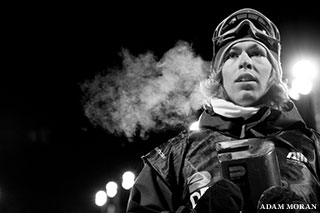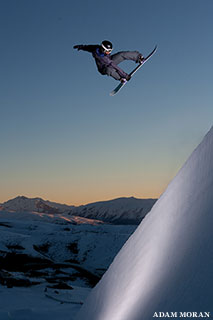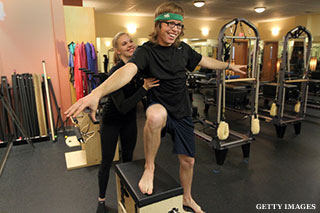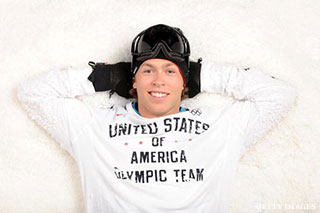Four years ago almost to this day, Kevin Pearce went snowboarding with his friends in Park City, Utah. Just part of the normal routine for the then 22-year-old, who was training for Vancouver and was on the brink of snowboarding superstardom. He had recently signed a sponsorship deal with Nike, and was considered to have a serious shot of ending Shaun White's supremacy in the sport. He was marketable and likable but even as success continued to come at him, he never forgot who his friends were and how he got to where he was. Which, four years ago, almost to this day, was the private half pipe in Park City that Nike had built specifically for his training. Kevin Pearce brought his friends along with him on New Year's Eve 2009, and they watched as he attempted a trick off the half pipe.

And then they watched, four years ago almost to this day, as Kevin Pearce missed the landing of the trick and brutally crashed down onto his head, was wheeled away in a stretcher and brought to the hospital, where it was determined that he had suffered a traumatic brain injury. His family and friends gathered around him, concerned for his life. The Olympics -- just 49 days away -- were no longer a concern. Surviving was.
Four years later, Kevin Pearce has not just survived, but endured and inspired. And four years later, director Lucy Walker has it all on film.
In her powerful documentary, The Crash Reel, which gets its official theatrical release Dec. 13, Walker found and collected film footage of Pearce's life from more than 200 different sources and used it to tell his story in an immensely personal, connected way. "The story is full of amazingly powerful emotion, which is difficult for a documentary," said the veteran filmmaker who was nominated for two Academy Awards, one for her film Waste Land in 2011, and one for The Tsunami and the Cherry Blossom in 2012.
Walker met Kevin the summer after his crash while at a mentoring retreat for Nike based around athletes and social change. “I spent some time with him and thought, 'Wow this is amazing'," Walker said. "What an incredible story he has. After a week, I thought, 'I should introduce him to a filmmaker to tell this story.' Then I realized, 'Wait, I should make this film.'"

In The Crash Reel, Walker documents not just the day of the crash itself, but the days that came long before it, and the many painstaking days that came after, to show us the kind of child Kevin was, the kind of person he became, the kind of passion he had for snowboarding, and, in what's the most powerful theme of the entire film, the incredible, close-knit family that shapes and supports him.
It's an inside look, at Pearce's life, story and recovery, that has no boundaries. As viewers, we're invited right into his world to see the intensely serious conversations between Pearce and his family, Pearce and his therapist, Pearce and his doctors. We see him immediately after his accident, not able to speak or understand anything. Then we see him slowly start to recover and live with his injury, although not quite ready to accept it. We see him go through anger, sadness, hope, despair, and happiness, sometimes changing moods in a matter of seconds. It’s a story about snowboarding, a story about traumatic brain injuries, a story about family, a story about life.
Editing the entire film and putting all of the clips together took a total of three and a half years. But of all that footage, the most hard-hitting parts of the documentary are the parts with his family -- the parts where, during his recovery, he begins talking about his desire to snowboard competitively again, and you can see the anguish his family feels just hearing him say the words, though they try and want to support him. The parts where Kevin, suffering from the effects of his traumatic brain injury, lashes out at them more easily, loses his patience much more quickly, and after hearing of his parents and brothers' reservations about him getting back into the competitive sphere, tells them, "I feel like there’s no trust in this family."

Kevin, at that point, was so caught up in this idea that he could recover and be the same snowboarder. That this injury wouldn't change the thing he loved so much. But one fall, even one small hit to his head, could paralyze him for life, or worse. His parents and brothers were not ready for him to take that chance.
Of course, if Kevin Pearce recovered from a terrible accident and became an Olympic snowboarder and beat Shaun White and did all the things he had planned to do before the accident, it would be a story straight out of the movies. But what The Crash Reel proves so well and so effectively is that this isn't fiction. This is somebody’s life on film. And in real life, while of course we're rooting for Kevin to recover and be able to do what he loves, we’re also able to see the other side of the story, the profound pain his family goes through at just the thought of him getting back on that snowboard again, and the tension that the difference in opinion causes.
"It was pretty wild, seeing that stuff," Pearce says of the moments with his family. "It was heavy to see that, like 'Damn, that went down. I was not aware that went down.' That's no BS, I really didn’t know that stuff was going on. My brain was thinking one way, and all the people that were helping me recover had a different mindset and were on a different page. Now that I see it, I understand what they went through, what I put them through."
It was eventually his brother, David, who has Down syndrome and has his own struggles accepting himself for who he is, was able to get through to Kevin by speaking the blatant truth. In his defense of why he doesn't want his brother to start snowboarding professionally again, David simply told Kevin, “I don't want you to die."
Kevin says the accident actually brought him even closer to his brother. “Growing up with a brother with Down syndrome taught me so much about special needs and life in general and how you really need to open your eyes and be aware of all situations,” he says. “My accident had a huge impact on David. It really affected him. And it brought us so much closer. Before, I was living a life where I was winning competitions and living that life, and now, with the life I’m living, we understand each other so much better now. Things are harder. Life is slower. And David understands that."

Taking the advice from David and his family, and taking note of his own physical limitations, Kevin eventually realized that the ending to his story was not going to be an Olympic gold medal. It wasn’t going to be professional snowboarding, period.
"The real moment I remember really realizing it is when I got back into a competition in Mt. Baker, Washington. It was the first time that I really tried to go fast and race down the mountain after my accident. It allowed me to understand how impaired my snowboarding was. You know, sitting in this chair right now, I feel totally fine. My brain doesn't tell me that I’m still injured. Yeah, there are issues with my vision and issues with my memory, but those things aren't telling me that I can't snowboard. Doctors tell me, parents tell me, but I didn’t believe that sh--. I thought I could do it."
So the question ahead of him then was "What now?"
"Before my injury, it was very clear what my life was going to be, the path I was taking,” Pearce says. “Since my injury, that path has been diverted. That’s not what I'm doing anymore. That’s not who I am. I'm not a professional snowboarder. How am I going to change? What am I going to do with my life?”
Enter Love Your Brain, Kevin's outreach campaign to educate the public about traumatic brain injuries and help those who, like him, are living with one. It's just in the beginning stages, but the goal is to inspire and educate all people about the human brain. TBIs have been talked about a bit more this year because of the stories about NFL players who've suffered from them, but the public's actually understanding is still very slim.
"It's important to teach people how invisible TBIs are,” he says. "If you saw me on the street, you wouldn't know that I had this severe, severe injury, like you would if I had two broken legs. It's important to not judge a book by its cover -- if someone’s acting differently, there could be something else going on there that we can’t see. We have to look more closely at the situation before judging."

His efforts are starting with selling merchandise: T-shirts, stickers, a glass bowl that his father, Simon Pearce, a professional glass-blower made by hand, the proceeds of which, according to the site, "support organizations that enrich and enhance the lives of families and individuals impacted by brain injury, Down syndrome and other challenges."
"We're starting to sell those small products now, and we're going to grow it bigger and raise more and more money,” Pearce says. "We’re just trying to educate people and inspire people in any way possible."
Kevin was able to start over, to take his past and put it toward a better, more informed future for himself and those around him. He was one of the lucky ones. But The Crash Reel is a look at life -- and in life, not everyone's story has a happy ending.
It didn’t for Sarah Burke, the 29-year-old freestyle skier who was a four-time Winter X Games gold medalist and was seriously injured after an accident in the same location -- Park City, Utah -- where Pearce suffered his accident. Unlike Pearce, she didn’t recover. Burke passed away on Jan. 19, 2012.
"Kevin's life is touched by many other lives that did not have happy outcomes," Walker says. “We wanted to pay tribute to Sarah and the other people around who weren't so lucky in the film. It helps to remember those stories. Kevin was very, very lucky."

And he doesn't take that luck for granted. He still snowboards casually with his friends because it's what he loves to do, but he's learned he must respect his limits, and that he must accept that he's nowhere near the level that he used to be. And while in the past, living his life to the fullest may have been mastering tricks and an attempt at getting to the Olympics, now it's using his experiences and pain to help change the lives of others.
"This film, and how I run my life now, it feels like it really impacts people, that I can really touch people,” Pearce says. “I wasn’t touching people in a meaningful and important way when I was snowboarding. It was like, 'Oh, great, Kevin is a good snowboarder and I was having a s--t-ton of fun, it was awesome. I was having the best time ever. But now, I can really make a change and really impact people."
The Crash Reel was shortlisted for a Best Documentary Oscar, meaning it is among the 15 films that will compete for the five official Academy Award nominations. It becomes available to own via download on Jan. 14, and on DVD on Feb. 4. It's a film that teaches us about TBIs. It teaches us about letting go. It teaches us about how we can pick ourselves back up and move forward when it seems like everything around us is collapsing.
And perhaps most of all, it teaches us that we should all try to live our lives a little bit more like Kevin Pearce.




